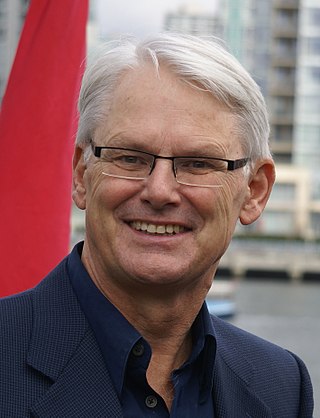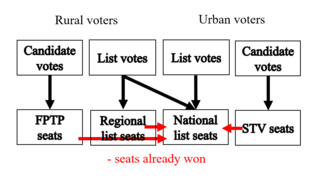National referendums are seldom used in Canada. The first two referendums in 1898 and 1942 saw voters in Quebec and the remainder of Canada take dramatically-opposing stands, and the third in 1992 saw most of the voters take a stand dramatically opposed to that of the politicians in power.

Gordon Muir Campbell, is a retired Canadian diplomat and politician who was the 35th mayor of Vancouver from 1986 to 1993 and the 34th premier of British Columbia from 2001 to 2011.
The Charlottetown Accord was a package of proposed amendments to the Constitution of Canada, proposed by the Canadian federal and provincial governments in 1992. It was submitted to a public referendum on October 26 and was defeated.
The harmonized sales tax (HST) is a consumption tax in Canada. It is used in provinces where both the federal goods and services tax (GST) and the regional provincial sales tax (PST) have been combined into a single value-added tax.

The 1995 Quebec referendum was the second referendum to ask voters in the predominantly French-speaking Canadian province of Quebec whether Quebec should proclaim sovereignty and become an independent country, with the condition precedent of offering a political and economic agreement to Canada.

A referendum was expected to take place in the United Kingdom in 2006 to decide whether the country should ratify the proposed Treaty establishing a Constitution for Europe. However, following the rejection of the Constitution by similar referendums in France in May 2005 and the Netherlands in June 2005, the UK vote was postponed indefinitely. The question was thought to have been settled when the constitution was superseded by the Treaty of Lisbon, which Parliament ratified in 2008 without holding a referendum.

Referendums in the United Kingdom are occasionally held at a national, regional or local level. Historically, national referendums are rare due to the long-standing principle of parliamentary sovereignty. Legally there is no constitutional requirement to hold a national referendum for any purpose or on any issue however the UK Parliament is free to legislate through an Act of Parliament for a referendum to be held on any question at any time.

A referendum was held in the Canadian province of British Columbia on May 17, 2005, to determine whether or not to adopt the recommendation of the Citizens' Assembly on Electoral Reform to replace the existing first-past-the-post electoral system (FPTP) with a single transferable vote system (BC-STV). It was held in conjunction with the BC Legislative Assembly election of 2005. Voters were given two ballots at that time: a ballot to vote for a Member of the Legislative Assembly of British Columbia (MLA) in their constituency and a referendum ballot. The referendum received considerable support from the electorate but failed in meeting the 60-percent threshold that had been set. A second referendum was held in 2009.

Elections BC is a non-partisan office of the British Columbia legislature responsible for conducting provincial and local elections, by-elections, petitions, referendums, plebiscites in the Canadian province of British Columbia. Its federal equivalent is Elections Canada.
The British Columbia Libertarian Party is a libertarian party in British Columbia, Canada, that nominated its first candidates in the 1986 provincial election. There has never been a Libertarian elected to the Legislative Assembly of British Columbia. The most recent election occurred under the leadership of Don Wilson where, in the 2020 British Columbia general election, the party fielded 25 candidates and received 8,360 votes, or 0.4% of the popular vote. Keith Macintyre had the best performance of any BC Libertarian candidate that year, in his electoral district of Penticton where he received 717 votes, or 2.6% of the popular vote. In 2021 they were viewed as a fringe party.
BC-STV is the proposed voting system recommended by the Citizens' Assembly on Electoral Reform in October 2004 for use in British Columbia, and belongs to the single transferable vote family of voting systems. BC-STV was supported by a majority of the voters in a referendum held in 2005 but the government had legislated that it would not be bound by any vote lower than 60 percent in favour. Because of the strong majority support for BC-STV, the government elected to stage a second referendum in 2009, but with increased public funding for information campaigns to better inform the electorate about the differences between the existing and proposed systems. The leadership of both the "yes" side and the "no" side were assigned by the government. The proposal was rejected with 60.9 percent voting against, vs. 39.1 percent in favour, in the 2009 vote.
The British Columbia Treaty Process (BCTP) is a land claims negotiation process started in 1993 to resolve outstanding issues, including claims to un-extinguished indigenous rights, with British Columbia's First Nations.

Following the 2005 electoral reform referendum, British Columbia held a second referendum on electoral reform in conjunction with the provincial election on May 12, 2009. As in 2005, voters in 2009 were asked were asked which electoral system should be used to elect legislators: the existing first-past-the-post electoral system or the BC single transferable vote electoral system (BC-STV) proposed by the British Columbia Citizen's Assembly on Electoral Reform to ensure more proportional representation in the provincial Legislative Assembly.
The British Columbia Recall and Initiative Referendum was a referendum held in British Columbia on October 17, 1991. It was concurrent with that year's general election. The referendum posed two questions. They were on whether elected officials should be able to be recalled and whether voters should be given a citizen's initiative. Both questions were decisively approved with over 80% of the electorate voting yes to both questions.

The Gibraltar sovereignty referendum of 2002 was a referendum, called by the Government of Gibraltar and held on 7 November 2002 within the British overseas territory, on a proposal by the UK Government to share sovereignty of the territory between Spain and the United Kingdom. The result was a rejection of the proposal by a landslide majority, with little more than one per cent of the electorate in favour.
The lack of treaties between the First Nations of British Columbia (BC) and the Canadian Crown is a long-standing problem that became a major issue in the 1990s. In 1763, the British Crown declared that only it could acquire land from First Nations through treaties. Historically, only two treaties were signed with the First Nations of British Columbia. The first of these was the Douglas Treaties, negotiated by Sir James Douglas with the native people of southern Vancouver Island from 1850 to 1854. The second treaty, Treaty 8, signed in 1899, was part of the Numbered Treaties that were signed with First Nations across the Prairie regions. British Columbian Treaty 8 signatories are located in the Peace River Country or the far north-east of BC. For over nine decades no more treaties were signed with First Nations of BC; many Native people wished to negotiate treaties, but successive BC provincial governments refused until the 1990s. A major development was the 1997 decision of the Supreme Court of Canada in the Delgamuukw v. British Columbia case that Aboriginal title still exists in British Columbia and that when dealing with Crown land, the government must consult with and may have to compensate First Nations whose rights are affected.

A referendum on sales tax was held by postal ballot in British Columbia from June 13 to August 5, 2011, though Canada Post workers were locked out until June 27. Voters were asked whether the Harmonized Sales Tax (HST) should be retained or split back to the original Provincial Sales Tax (PST) and Goods & Services Tax (GST). If the majority of voters voted "Yes" to extinguish the HST, 7% PST would be reinstated and the combined tax rate would remain at 12%. If the majority of voters voted "No", the BC government would reduce the HST rate to 11% in 2012 and 10% in 2014.
A referendum is a direct vote in which an entire electorate is asked to either accept or reject a particular proposal. This article summarises referendum laws and practice in various countries.

A referendum on electoral reform took place by mail-in ballot between October 22 and December 7, 2018, in the Canadian province of British Columbia. 61.3 percent of voters supported maintaining the first-past-the-post voting system rather than switching to a proportional representation voting system, which was supported by 38.7 percent of voters. This was British Columbia's third referendum on electoral reform, following ones in 2005 and 2009.

Rural–urban proportional representation (RUP), also called flexible district PR, is a supermixed electoral system which combines the use of single- and multi-member constituencies in a lower tier and top-up seats in an upper tier to meet the different needs of both rural and urban areas, while protecting the objective of proportionality. The term was coined by Fair Vote Canada, which devised a rural–urban system with the intention of meeting the special challenges of Canada's geography, which includes wide-flung, sparsely populated areas.











